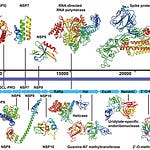Podcast Shownotes: Exploring Human Origins and the Meaning of Existence Through Newton’s Insight
This episode delves into the origins of humanity and the meaning of existence from Sir Isaac Newton's perspective, while also questioning the validity of the theory of evolution.
---
1. Humanity: A Marvelous Creation of God
The article highlights Newton's view that the intricate structure and function of the human body serve as evidence of God's creation.
Newton once said, "How marvelous is man, a creation of God."
The author elaborates on Newton's perspective, emphasizing the unique value and function of every part of the human body, with no part being superfluous. This level of perfect design, the author argues, cannot be adequately explained by evolutionary concepts like “natural selection” or “use and disuse.”
For instance, some might question the purpose of the appendix, suggesting it is dispensable. However, the appendix contains lymphoid tissue and plays an essential role in immune function, acting as a reservoir for beneficial bacteria and supporting immune cell activity. Can it still be considered redundant?
The author also lists seven points raised by Newton regarding the body's remarkable design, reflecting God's intention in creating humanity.
---
2. The Flaws of Evolutionary Theory
The author challenges the idea that humans evolved from apes, pointing out unresolved issues within evolutionary theory.
To this day, no definitive conclusion has been reached, largely due to a critical issue—the so-called “missing link” in evolutionary history. Can organisms truly survive in these transitional stages?
The article highlights the theory’s inability to explain the irreducible complexity of biological systems. For example, structures like the lungs and eyes are so intricate that they could not have evolved gradually.
The author further critiques evolution using evidence from chromosomes, genes, and DNA, arguing that relying solely on superficial similarities to trace human origins is insufficient and flawed.
---
3. The Fine-Tuned Universe Points to an Intelligent Creator
Citing the concept of the “fine-tuned universe,” the author argues that the precise calibration of various physical constants in the cosmos cannot be a mere coincidence but instead points to the existence of an intelligent designer.
For example, if the gravitational constant were altered by even 1 in 10^60, the universe would fail to form, as rapid expansion would prevent planets from taking shape.
The article examines possible explanations for the universe’s existence—necessity, chance, and intelligent design—and concludes that only intelligent design can reasonably account for the cosmos’ precision and wonder.
---
4. Humanity’s Limitations vs. God’s Infinite Wisdom
The author underscores the humility and reverence of Newton—a great scientist—toward God’s creation. Despite his extraordinary intellect, Newton acknowledged the limitations of human knowledge and the boundless wisdom of God.
Even someone as brilliant as Newton displayed an attitude of humility, which the author believes is worth emulating.
Readers are encouraged to recognize humanity’s limitations while pursuing scientific exploration and to seek truth and wisdom from God’s creation.
---
5. Conclusion: Reflecting on the Marvels of God’s Creation
The article concludes by quoting Psalm 111:2, "Great are the works of the Lord; they are pondered by all who delight in them." It invites readers to appreciate and marvel at the wonders of God’s creation.
In summary, this piece combines faith with scientific and logical reasoning to explore the origins and meaning of human existence. It passionately articulates the greatness of God’s creation, skillfully integrating biblical references and scientific insights to support its arguments.
Source:











Share this post